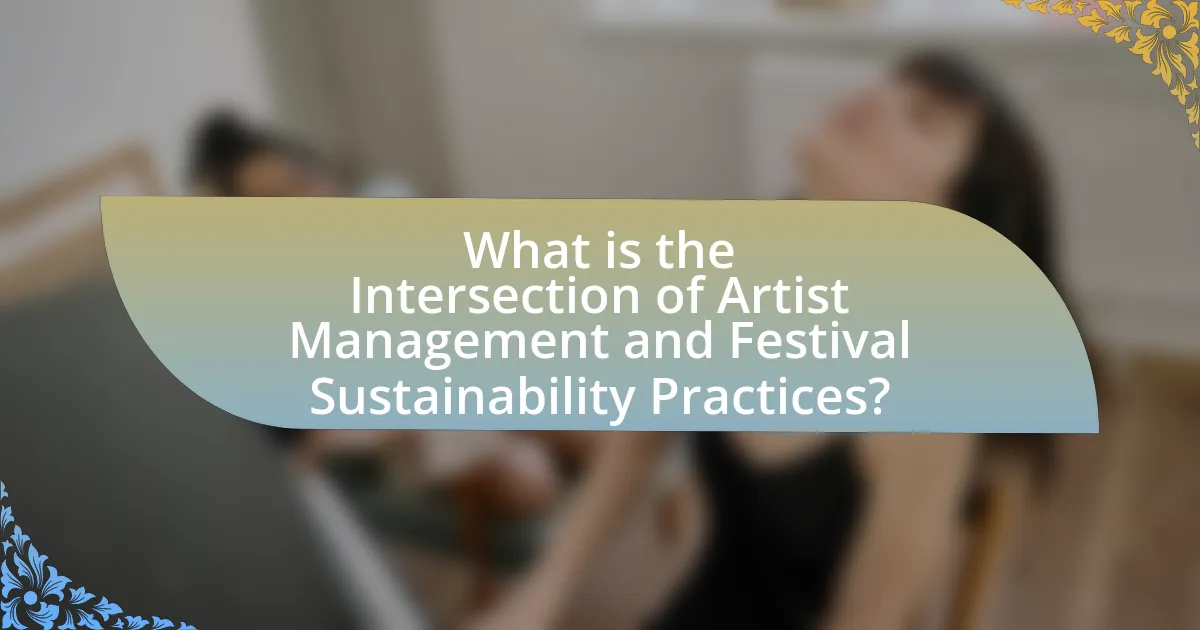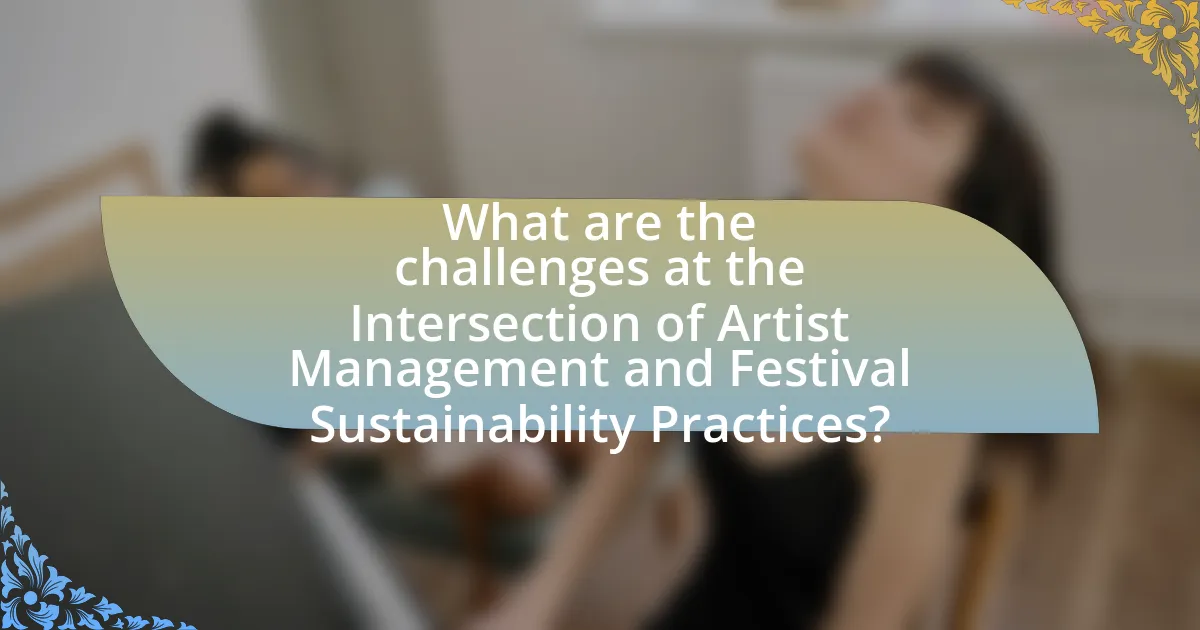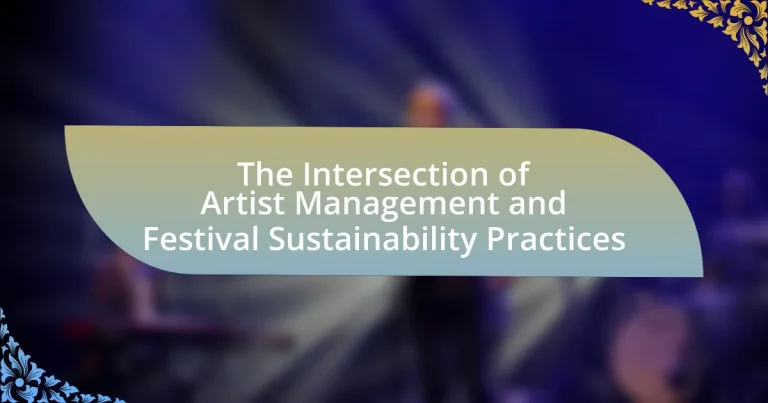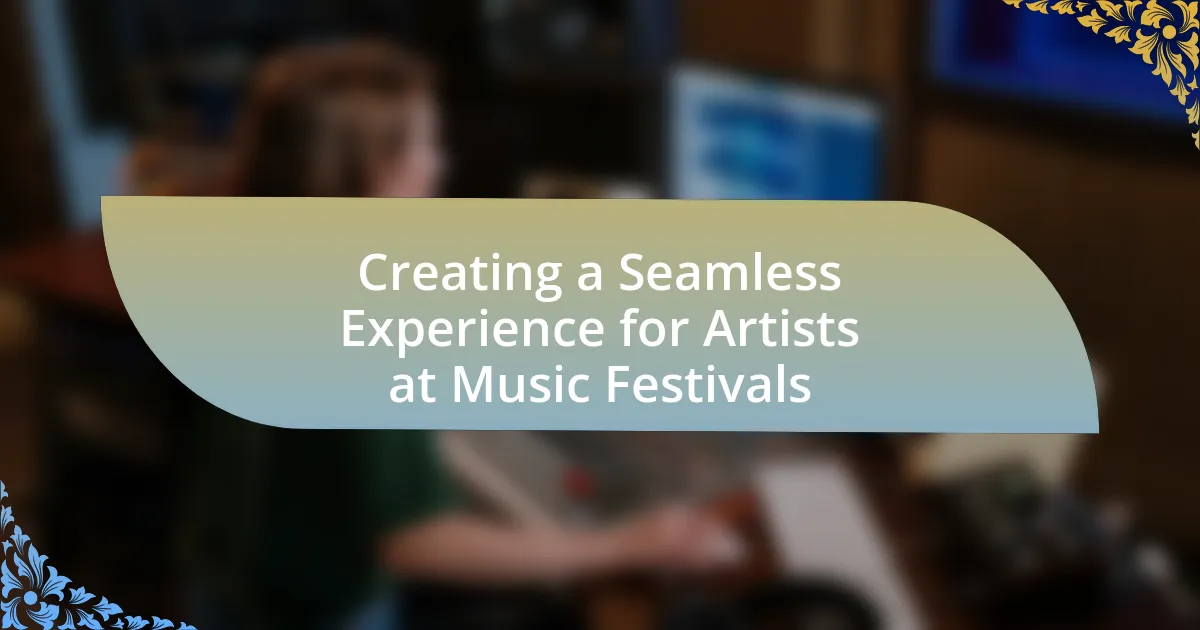The article examines the intersection of artist management and festival sustainability practices, highlighting the collaborative efforts to promote environmentally responsible behaviors among artists and festival organizers. It discusses how artist managers can influence artists to adopt eco-friendly measures, such as waste reduction and renewable energy use, while also addressing the growing consumer demand for sustainability in the music industry. Key components include the roles of artists in raising awareness, the responsibilities of artist managers during festivals, and the challenges faced in implementing sustainable practices. The article emphasizes the importance of collaboration between artists and festival organizers to enhance sustainability efforts and improve overall environmental outcomes in the music sector.

What is the Intersection of Artist Management and Festival Sustainability Practices?
The intersection of artist management and festival sustainability practices lies in the collaborative efforts to promote environmentally responsible behaviors among artists and festival organizers. Artist managers play a crucial role in advocating for sustainable practices by encouraging artists to adopt eco-friendly measures, such as reducing waste, utilizing renewable energy sources, and promoting sustainable transportation options during festivals. For instance, festivals like Glastonbury have implemented initiatives to minimize their carbon footprint, and artist managers can influence their clients to participate in these efforts, thereby enhancing the overall sustainability of the event. This synergy not only benefits the environment but also aligns with the growing consumer demand for sustainable practices in the music industry, as evidenced by studies showing that 70% of festival-goers prefer events that prioritize sustainability.
How do artist management and festival sustainability practices relate to each other?
Artist management and festival sustainability practices are interconnected as effective artist management can promote and implement sustainable practices within festivals. Artist managers often influence the choices of artists regarding their participation in events, including their preferences for environmentally friendly practices. For instance, artists may prioritize festivals that demonstrate a commitment to sustainability, such as reducing waste or using renewable energy sources. This relationship is supported by the growing trend of festivals adopting sustainability certifications, which can enhance their appeal to both artists and audiences. According to a 2021 report by the International Music Summit, 70% of artists expressed a preference for working with festivals that prioritize sustainability, indicating a direct link between artist management decisions and festival sustainability efforts.
What roles do artists play in promoting sustainability at festivals?
Artists play a crucial role in promoting sustainability at festivals by using their platforms to raise awareness and inspire action among attendees. They often incorporate eco-friendly themes into their performances, encouraging audiences to consider environmental issues. For instance, many artists advocate for waste reduction, renewable energy use, and sustainable practices through their music, visuals, and public statements. Research indicates that festivals featuring artists who prioritize sustainability can see increased participation in eco-friendly initiatives, such as recycling and conservation efforts, demonstrating the tangible impact artists have on fostering a culture of sustainability within the festival environment.
How can artist managers influence sustainability initiatives?
Artist managers can influence sustainability initiatives by advocating for eco-friendly practices within their artists’ tours and events. They can implement strategies such as selecting venues with sustainable certifications, promoting the use of renewable energy sources, and encouraging waste reduction measures. For instance, a study by the Green Music Initiative highlights that artist managers who prioritize sustainability can significantly reduce the carbon footprint of tours by 50% through efficient logistics and sustainable merchandise practices. By leveraging their position, artist managers can also collaborate with festivals to integrate sustainability into event planning, thereby setting industry standards and inspiring other stakeholders to adopt similar practices.
Why is the intersection of these two fields important?
The intersection of artist management and festival sustainability practices is important because it fosters a collaborative approach that enhances both the environmental impact of festivals and the career development of artists. By integrating sustainability into artist management, festivals can attract eco-conscious audiences and artists who prioritize environmental responsibility, thereby increasing their marketability and relevance. Research indicates that festivals implementing sustainable practices can reduce waste by up to 50% and lower carbon footprints significantly, which not only benefits the environment but also aligns with the values of a growing demographic of environmentally aware consumers. This synergy ultimately leads to more successful events and sustainable careers for artists, creating a win-win scenario for both fields.
What impact does artist management have on festival sustainability outcomes?
Artist management significantly influences festival sustainability outcomes by shaping the environmental and social practices of artists. Effective artist management can encourage performers to adopt eco-friendly behaviors, such as using sustainable transportation and minimizing waste during their performances. For instance, festivals that collaborate with artist managers to promote sustainability initiatives often see a reduction in carbon footprints and increased community engagement. Research indicates that festivals implementing sustainable practices, supported by artist management, can enhance their overall sustainability ratings, as evidenced by the Greener Festival Awards, which recognize events that prioritize environmental responsibility.
How do sustainability practices enhance the artist’s brand and reputation?
Sustainability practices enhance an artist’s brand and reputation by aligning their image with environmentally conscious values, which increasingly resonate with audiences. Artists who adopt sustainable methods, such as using eco-friendly materials or reducing waste during performances, demonstrate social responsibility, attracting fans who prioritize sustainability. For instance, a survey by Nielsen found that 73% of millennials are willing to pay more for sustainable products, indicating a market advantage for artists who embrace these practices. This alignment not only fosters a positive public perception but also differentiates the artist in a competitive industry, ultimately leading to increased loyalty and support from fans.

What are the key components of Artist Management in relation to Festivals?
The key components of Artist Management in relation to Festivals include talent booking, logistical coordination, contract negotiation, and artist promotion. Talent booking involves selecting and securing artists who align with the festival’s theme and audience, ensuring a diverse and appealing lineup. Logistical coordination encompasses managing travel arrangements, accommodations, and on-site requirements for artists, which is crucial for a smooth festival experience. Contract negotiation is essential for establishing terms that protect both the artist’s interests and the festival’s operational needs, including performance fees and rider specifications. Lastly, artist promotion focuses on marketing the artists effectively to enhance ticket sales and audience engagement, often leveraging social media and other platforms to maximize visibility. These components are vital for successful artist management, directly impacting the overall success and sustainability of the festival.
What responsibilities do artist managers have during festivals?
Artist managers are responsible for coordinating logistics, ensuring artist welfare, and facilitating communication during festivals. They manage schedules, oversee performance requirements, and liaise with festival organizers to ensure that the artist’s needs are met. Additionally, they handle any issues that arise on-site, such as technical difficulties or scheduling conflicts, to maintain a smooth operation. This role is crucial for the artist’s performance success and overall festival experience, as effective management directly impacts the artist’s ability to engage with the audience and perform at their best.
How do artist managers coordinate with festival organizers for sustainability?
Artist managers coordinate with festival organizers for sustainability by collaborating on eco-friendly practices and logistics. They engage in discussions to align the artist’s values with the festival’s sustainability goals, ensuring that the artist’s performance adheres to environmentally responsible standards. For instance, they may negotiate the use of renewable energy sources for stage setups, advocate for waste reduction strategies, and promote the use of sustainable materials in merchandise. This collaboration is often supported by industry guidelines and frameworks, such as the “Green Music Initiative,” which provides resources for reducing the environmental impact of live events.
What strategies do artist managers use to promote eco-friendly practices?
Artist managers promote eco-friendly practices by implementing sustainable touring strategies, such as reducing carbon footprints through efficient transportation and accommodation choices. They often collaborate with venues and festivals that prioritize sustainability, ensuring that events utilize renewable energy sources and minimize waste. Additionally, artist managers encourage artists to engage in eco-conscious merchandise production, using sustainable materials and ethical sourcing. They also advocate for awareness campaigns that educate fans about environmental issues, leveraging the artists’ platforms to promote eco-friendly messages. These strategies are supported by industry trends showing a growing demand for sustainability in music events, with reports indicating that 70% of festival-goers prefer attending eco-friendly events.
How do artists contribute to festival sustainability?
Artists contribute to festival sustainability by promoting eco-friendly practices through their performances and public engagement. They often advocate for environmental awareness, using their platforms to encourage audiences to adopt sustainable behaviors, such as reducing waste and supporting local initiatives. For instance, many artists collaborate with festivals to implement green technologies, like solar-powered stages or waste reduction programs, which can significantly lower the carbon footprint of events. Additionally, artists can influence festival organizers to prioritize sustainability in their planning and operations, leading to more environmentally conscious events. This collaborative approach not only enhances the festival experience but also fosters a culture of sustainability within the music and arts community.
What initiatives can artists take to reduce their environmental impact?
Artists can reduce their environmental impact by adopting sustainable practices such as using eco-friendly materials, minimizing waste, and promoting awareness through their platforms. For instance, artists can choose biodegradable or recycled materials for their artwork and merchandise, which significantly lowers the carbon footprint associated with production. Additionally, they can implement waste reduction strategies, such as digital art forms that eliminate physical waste or organizing events that prioritize recycling and composting. Furthermore, artists can leverage their influence to advocate for environmental issues, encouraging fans and fellow creators to engage in sustainable practices. This approach not only contributes to environmental conservation but also raises public consciousness about sustainability in the arts.
How can artists engage their audience in sustainability efforts at festivals?
Artists can engage their audience in sustainability efforts at festivals by incorporating eco-friendly themes into their performances and promoting sustainable practices through their platforms. For instance, artists can use their stage time to raise awareness about environmental issues, share information on recycling and waste reduction, and encourage fans to participate in sustainability initiatives. Research indicates that 72% of festival-goers are more likely to support artists who advocate for environmental causes, demonstrating the effectiveness of such engagement strategies. By actively involving their audience in discussions and activities related to sustainability, artists can foster a community committed to environmental stewardship at festivals.

What are the challenges at the Intersection of Artist Management and Festival Sustainability Practices?
The challenges at the intersection of artist management and festival sustainability practices include balancing artistic freedom with environmental responsibilities. Artist managers often prioritize the creative vision and logistical needs of their artists, which can conflict with sustainable practices such as reducing waste and carbon footprints. For instance, the demand for elaborate stage setups and extensive travel can lead to increased resource consumption and emissions. Additionally, there is often a lack of awareness or commitment to sustainability among artists, which complicates the implementation of eco-friendly initiatives. According to a 2021 report by the International Music Summit, 70% of festival organizers cited the need for better collaboration with artists to achieve sustainability goals, highlighting the ongoing struggle to align artistic ambitions with environmental stewardship.
What obstacles do artist managers face in implementing sustainability practices?
Artist managers face several obstacles in implementing sustainability practices, primarily due to financial constraints, lack of industry standards, and limited awareness among artists and stakeholders. Financial constraints often hinder the ability to invest in sustainable technologies or practices, as many managers operate within tight budgets. Additionally, the absence of universally accepted sustainability standards creates confusion and inconsistency, making it difficult for managers to adopt effective practices. Limited awareness among artists and stakeholders about the importance of sustainability further complicates efforts, as it can lead to resistance or lack of engagement in sustainability initiatives. These challenges collectively impede the integration of sustainable practices within the artist management sector.
How can financial constraints affect sustainability initiatives at festivals?
Financial constraints can significantly limit the implementation of sustainability initiatives at festivals. When budgets are tight, festival organizers may prioritize essential operational costs over investments in eco-friendly practices, such as waste management systems, renewable energy sources, or sustainable transportation options. For instance, a study by the Green Music Initiative found that festivals with limited financial resources often resort to single-use materials instead of investing in reusable or biodegradable alternatives, which can lead to increased waste and environmental impact. Additionally, financial limitations can hinder partnerships with sustainable vendors or the adoption of innovative technologies that promote sustainability, ultimately compromising the festival’s overall environmental goals.
What resistance might artists encounter when advocating for sustainability?
Artists advocating for sustainability may encounter resistance from various stakeholders, including festival organizers, audiences, and industry peers. Festival organizers often prioritize profit margins and may view sustainable practices as costly or logistically challenging, leading to reluctance in adopting eco-friendly measures. Audiences might resist changes in programming or ticket pricing associated with sustainability initiatives, preferring traditional experiences over new, environmentally-focused approaches. Additionally, industry peers may be skeptical of the effectiveness of sustainability efforts, questioning their impact or authenticity, which can create a divide within the artistic community. This resistance can hinder the implementation of sustainable practices in the arts and festival sectors.
How can these challenges be overcome?
To overcome the challenges at the intersection of artist management and festival sustainability practices, collaboration between artists, managers, and festival organizers is essential. This collaboration can lead to the development of sustainable practices that align with the artistic vision while minimizing environmental impact. For instance, implementing eco-friendly transportation options for artists and crew can significantly reduce carbon footprints, as evidenced by festivals that have adopted shuttle services, resulting in a 30% decrease in emissions. Additionally, educating artists about sustainable practices can foster a culture of environmental responsibility, as seen in initiatives where artists actively promote sustainability during their performances. By prioritizing communication and shared goals, the challenges can be effectively addressed, leading to more sustainable festival practices.
What best practices can artist managers adopt to promote sustainability?
Artist managers can promote sustainability by implementing eco-friendly practices in their operations and advocating for sustainable initiatives within the music industry. They can prioritize the use of renewable energy sources for events, encourage artists to adopt sustainable merchandise practices, and collaborate with venues that prioritize environmental responsibility. For instance, a study by Julie’s Bicycle highlights that music events can reduce carbon footprints by up to 50% through sustainable practices. Additionally, artist managers can educate their clients about the importance of sustainability, fostering a culture of environmental awareness among artists and their fanbases.
How can collaboration between artists and festival organizers enhance sustainability efforts?
Collaboration between artists and festival organizers can significantly enhance sustainability efforts by integrating eco-friendly practices into event planning and execution. When artists actively participate in the design and implementation of sustainable initiatives, such as using renewable materials for stage setups or promoting waste reduction strategies, they can influence audience behavior and raise awareness about environmental issues. For instance, festivals like Glastonbury have successfully partnered with artists to promote recycling and reduce single-use plastics, resulting in a measurable decrease in waste. This collaborative approach not only fosters a culture of sustainability within the festival community but also amplifies the message to attendees, encouraging broader societal change towards environmental responsibility.
What practical steps can be taken to improve the intersection of these fields?
To improve the intersection of artist management and festival sustainability practices, implementing collaborative frameworks between artists and festival organizers is essential. This can be achieved by establishing sustainability guidelines that artists can incorporate into their performances, such as using eco-friendly materials and reducing waste. Research indicates that festivals adopting sustainable practices can enhance their brand image and attract environmentally conscious audiences, as seen in the case of the Glastonbury Festival, which has implemented extensive waste management and renewable energy initiatives. Additionally, providing training for artists on sustainability can foster a culture of environmental responsibility within the music industry, leading to more sustainable practices overall.
How can artist managers effectively communicate sustainability goals to artists?
Artist managers can effectively communicate sustainability goals to artists by establishing clear, consistent messaging that aligns with the artists’ values and practices. This involves engaging artists in discussions about sustainability, providing them with relevant data on environmental impacts, and showcasing successful case studies from the industry. For instance, a survey by the Music Industry Green Initiative found that 70% of artists are more likely to support sustainability initiatives when they understand the positive impact on their brand and audience. By utilizing this approach, artist managers can foster a collaborative environment that encourages artists to adopt and promote sustainable practices.
What resources are available for artist managers to support sustainability practices?
Artist managers can access various resources to support sustainability practices, including industry guidelines, educational programs, and partnerships with environmental organizations. The Music Industry Green initiative provides a framework for reducing the environmental impact of music events, while organizations like Reverb offer tools and resources for artists and managers to implement eco-friendly practices. Additionally, the Sustainable Music Cities initiative promotes collaboration among local governments, artists, and venues to foster sustainable practices in the music industry. These resources are designed to help artist managers integrate sustainability into their operations effectively.





